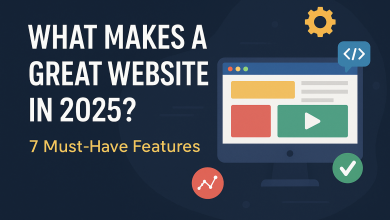🧱 Introduction
Building a website in 2025 has never been easier—but with so many platforms available, how do you choose the right one?
Two of the most popular options are website builders (like Wix, Squarespace, or Weebly) and WordPress (the self-hosted, open-source CMS). Both offer unique features and user experiences, but they cater to very different audiences.
In this guide, we’ll break down the pros, cons, and best use cases for both platforms, helping you confidently choose the right one for your goals.
🛠️ What Are Website Builders?
Website builders are all-in-one platforms designed to make website creation easy—especially for beginners. These tools offer:
- Drag-and-drop interfaces
- Pre-designed templates
- Built-in hosting
- Technical support
- Automatic updates and security
Popular builders include Wix, Squarespace, Shopify, and Weebly.
🌐 What Is WordPress?
WordPress.org is a powerful open-source content management system (CMS). It’s installed on a web hosting server and offers complete flexibility and customization.
With WordPress, you get:
- Full control over your site’s code
- Thousands of free and premium themes/plugins
- Access to SEO, eCommerce, and performance tools
- A massive global community
Note: This guide refers to WordPress.org, not the limited WordPress.com platform.
⚖️ Key Comparison: Website Builders vs WordPress
| Feature | Website Builders | WordPress (Self-Hosted) |
|---|---|---|
| Ease of Use | Extremely beginner-friendly | Moderate learning curve |
| Design Flexibility | Limited to templates & widgets | Unlimited via themes & custom code |
| Cost | Monthly subscription (incl. hosting) | Hosting + domain + optional plugins |
| Ownership | Platform-owned (limited access) | Full ownership and control |
| SEO Features | Basic built-in SEO | Advanced SEO via plugins (e.g., Yoast) |
| eCommerce | Built-in tools (Shopify, Wix Stores) | WooCommerce & integrations |
| Support | 24/7 support from provider | Community-based or managed hosts |
🎯 When to Choose a Website Builder
You should consider a website builder if:
- ✅ You want to launch a site quickly and easily
- ✅ You don’t want to deal with code or hosting
- ✅ You’re building a portfolio, brochure site, or simple store
- ✅ You prefer an all-in-one solution with minimal maintenance
Best For:
- Freelancers
- Local businesses
- Creatives and portfolios
- Event landing pages
🧩 When to Choose WordPress
WordPress is ideal if:
- ✅ You need advanced customization and scalability
- ✅ You want full control over design, performance, and plugins
- ✅ You plan to create a blog, large website, or complex store
- ✅ You care about SEO, speed, and long-term growth
Best For:
- Bloggers
- Content-heavy websites
- Online stores (WooCommerce)
- Agencies and developers
🏆 Website Builder Pros and Cons
✅ Pros:
- All-in-one setup
- No coding required
- Professional templates
- Reliable support
❌ Cons:
- Limited flexibility
- Harder to migrate
- Can become expensive at scale
🏆 WordPress Pros and Cons
✅ Pros:
- Full customization
- Massive plugin/theme ecosystem
- SEO-friendly
- Highly scalable
❌ Cons:
- Requires hosting and maintenance
- Learning curve for beginners
- Needs security management
💡 SEO & Monetization: Which Is Better?
For SEO and AdSense, WordPress generally wins:
- Easily integrates with tools like Yoast SEO, Rank Math, and Google Site Kit
- Full control over schema, robots.txt, and caching
- Better options for page speed and mobile optimization
However, website builders can still rank well—especially for simple local sites or portfolios with low competition.
📊 Which One Should You Choose?
Ask yourself:
- Do I want complete control or simple convenience?
- Am I comfortable managing plugins and hosting?
- Will my site need advanced functionality or grow over time?
Choose Website Builders if: You want speed, ease, and a hands-off approach.
Choose WordPress if: You want flexibility, SEO control, and long-term scalability.
✅ Conclusion: Pick the Right Tool for Your Online Success
Whether you’re launching a blog, portfolio, or full-scale eCommerce brand, your choice between website builders and WordPress will shape your growth path.
If you’re just starting and need something fast and simple—go with a builder. But if you’re aiming for maximum control, better SEO, and long-term success, WordPress is the clear winner.
Start small, scale smart, and build a site that works for you in 2025 and beyond.





